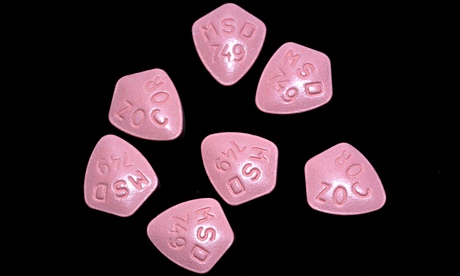
Simvastatin tablets may alleviate the onset of multiple sclerosis. Photograph: Scott Camazine/Alamy
A cholesterol-lowering statin taken by large numbers of people in the UK could also help people suffering from advanced multiple sclerosis, according to scientists.
There are no convincing treatments for MS once it moves into the later, progressive phase. Early on, most people experience what is known as relapsing-remitting disease, where their condition gets worse and then stabilises. But in the later stages, there is no let-up in decline and sufferers progressively lose muscular function and become more disabled.
But a trial among 140 people in the progressive phase of the disease has provided some hope of a possible treatment to slow the rate of decline.
Researchers, writing in the Lancet medical journal, , say they chose to try statins because they have been shown to have anti-inflammatory and neuroprotective effects on the nervous system.
In the trial they administered high dosage (80mg) simvastatin, the most commonly used of the anti-cholesterol drugs. Half the group, randomly chosen, took the statin for two years, while the others were given a placebo.
"In the progressive stage of MS the brain shrinks by about 0.6% a year. Our main measure of success was to reduce the rate of brain atrophy", said Dr Jeremy Chataway of University College London Hospitals and UCL, who led the study.
MRI scans of the brains of the participants before the study started and after it ended showed that those who were given simvastatin did experience less shrinkage of the brain – by 0.3% a year on average rather than the expected 0.6%, a reduction of 43% when adjustments were made for the age and gender of the volunteers.
Although it was not a central part of the trial, which was carried out only to look at the effect on the brain, the patients were also found to have small but significant improvements in their disability scores, by comparison with the people who had taken placebo tablets.
Chataway acknowledges that the results of the brain scans, although exciting for scientists, may not actually translate into improvements in the condition of MS patients. But, he said, the results meant that it would be worth carrying out a full-scale trial.
The trial built on two decades of work by Professor John Greenwood at the UCL Institute of Ophthalmology. He had investigated the potential benefit of statins in auto-immune diseases such as uveitis, which affects the retina, because of statins' record as anti-inflammatories.
This study suggests, however, that the beneficial effect might be on vascular function rather than the immune system, he added. "After nearly two decades of research, it is immensely gratifying to see this work progress into the clinic to deliver benefits to patients," he said.
MS is an autoimmune disease in which myelin, the fatty insulating material that covers nerve fibres, is destroyed by the body's own defences. Nerves lacking myelin are not able to transmit messages properly, leading to symptoms ranging from mild tingling or numbness to full blown paralysis.
Dr Susan Kohlhaas, head of biomedical research at the MS Society, said: "There are no treatments that can stop the condition from worsening in people with progressive MS. Scientists have worked for years to find a potential treatment that could help people, and now, finally, one has been found. This is very exciting news.
"Further, larger clinical trials are now absolutely crucial to confirm the safety and effectiveness of this treatment, but for now, people with MS should be really encouraged by these results."
Statins are out of patent and therefore now very cheap – a month's supply of 20 mg simvastatin costs less than £8, although the treatment for MS would be at a much higher dose.